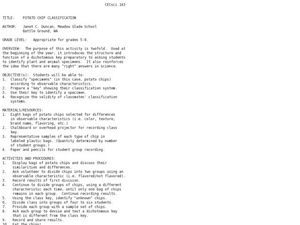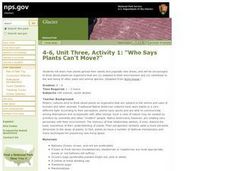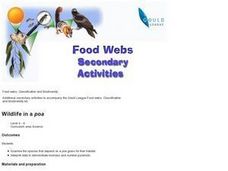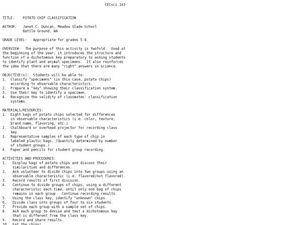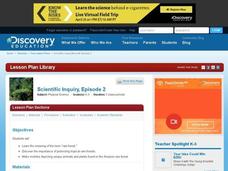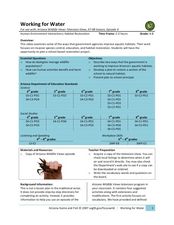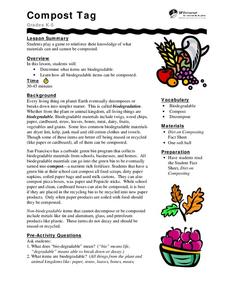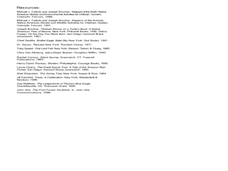Larson Lab
Animal Classification
How are animals classified? Scholars explore animal classification by observing non-living and living specimens. They learn how to organize animals into vertebrates and invertebrates and identify the five vertebrate groups: mammals,...
Curated OER
Animal Classification
Students are introduced to the concept of classification as it relates to objects, information, and characteristics. In this classification lesson, students research a variety of animals. Students study the Linnaeus's system of...
Curated OER
Potato chip Classification
Students create a dichotomous key using potato chips. For this classification lesson, students sort potato chips into groups based on observable characteristics. They record their results to create a dichotomous key in preparation for...
University of Wisconsin
Bimodel Botany Bouquet
Gardeners are given an individual plant specimen from a bouquet of local rain garden plants. They group up by their plant type and then make observations together, name the plant, and introduce it to the rest of the class. You then share...
Curated OER
From Curiosity Cabinet to Museum Collection
Students study binomial nomenclature and museum-based research. They create a curiosity box, label the objects in their curiosity box , develop a classification scheme for the objects, and create a database of all objects collected by...
Curated OER
School Yard Park/ Ecosystem
Fifth graders examine ecosystems in their schoolyard. In this nature and ecosystem lesson, 5th graders map their schoolyard into workable plots. They classify plants and animals found in the plot. They revisit their site every two weeks...
Curated OER
Classify UT Plants and Animals
Learners practice using 2 different plant classification keys to identify species. They make choices between the similarities and differences between their object and the classification scheme.
Curated OER
I Know What I Am... but, What Are You? (Classifying Living Things)
Learners examine how to classify living things by effects, environment, and activity. They explore various websites, develop a list of facts they learn about classifications, and participate in a distance online learning session with the...
Curated OER
Classification 2
Students discuss what makes a living thing (for example, cellular respiration) and collect a selection of living things from outside. They divide their organisms into plants and animals and create a key for the divisions.
Curated OER
Who Says Plants Can't Move?
Students discover how plants spread their seeds using other plants and animals. In this plant instructional activity, students role play different plants and how their seeds travel. Students then have a class discussion to ensure their...
Curated OER
Wildlife in a Poa
Students examine the species that depend on a poa grass for their habitat and interpret data to demonstrate biomass and number pyramids. They examine the plant by digging it up and pulling it apart quickly to capture all the...
Curated OER
Potato Chip Classification
Young scholars classify specimens by observable characteristics. By classifying potato chips, they are introduced to the dichotomous key for identifying plant and animal specimens.
Curated OER
Teaching Kids about the Environment
Fifth graders identify the species of plants and animals found in an environment. They compare these findings to plant and animal species found in an unlike environment. Students acquire and compare soil samples from the two sites chosen.
Curated OER
Native vs. Non-native Species: Who Will Win?
Pupils examine non-native species and the problems they have caused in the waters of the Chesapeake Bay. They create a "Wanted" poster for one of the species. They describe the effects of non-native species on the schoolyard species.
Curated OER
Pyramid of Biomass
Learners interpret data to demonstrate biomass and number pyramids. They use information to draw conclusions and examine an example of biological magnification.
Curated OER
Food Web Chasey
Students work together to review the concepts of food webs and food chains. They describe the role of plants and animals when dealing with the cycling of energy. They identify any behavioural strategies to help the animals survive.
Curated OER
The Unique Rain Forest
Students explore the unique Rain Forest. In this Rain Forest instructional activity, students watch a video about the dangers the Rain Forest faces. Students create a Rain Forest mobile. Students choose plants or animals from the...
Curated OER
Life at Risk
Students examine the characteristics of the peregrine falcon. They investigate endangered and extinct species, and how the environment affects the process.
Curated OER
Working for Water
Learners examine the ways that government works to help improve aquatic habitats. In this water habitats activity students view a video and plan a school restoration project.
Curated OER
Touching Traits
Students describe objects using only their sense of touch. In this lesson on describing characteristics, students use only their sense of touch to describe an unseen object in a box. This lesson can be used an an introduction to plant...
Curated OER
The Great Spoon Challenge: Form and Function
Learners organize objects in terms of form and function. In this architecture lesson, students are introduced to the ideas of form and function by playing a game in which they organize spoons in different ways. Extension activities are...
SF Environment
Compost Tag
Composting is a great way to get children involved in recycling. First, they discuss how biodegradable products decompose to make compost. Then, they talk about what can and cannot be composted. They play a game similar to around the...
Curated OER
Red Tail Ridge Wetland Study Project
Fifth graders use a real life scenario of the wetlands to gather information on creatures of the habitat. For this wetlands lesson, 5th graders research the interdependence of organisms in a healthy habitat. Students collected samples...
Curated OER
Exploring Limu Diversity
Young scholars explore limu diversity. In this ocean ecosystem lesson, students classify limu according to its physical properties. Young scholars work in small groups to generate scientific observations and sort limu by characteristics.




